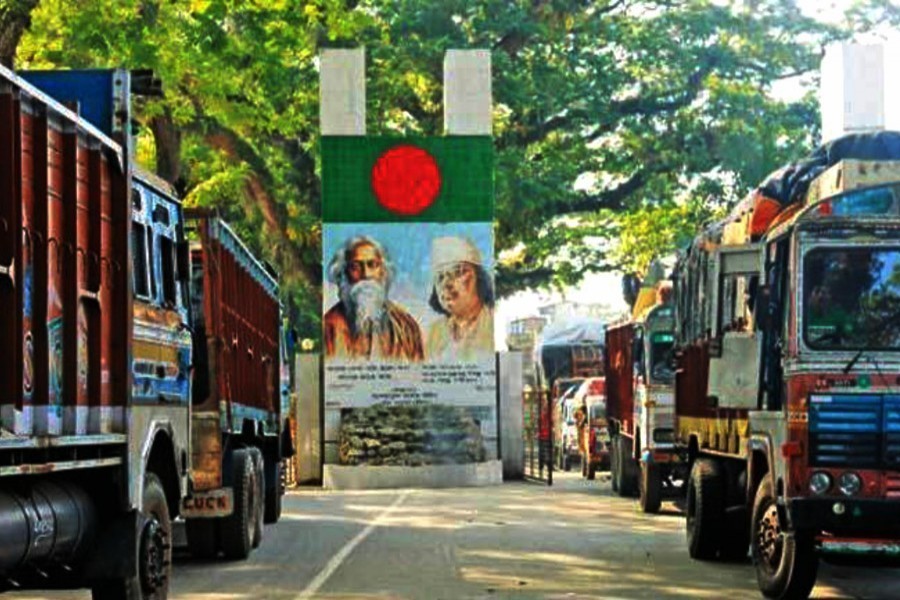Government's revenue authority has officially shut down 126 customs borders, which account for 70 per cent of its trans-border road, rail and water routes to India and Myanmar.
Officials say the National Board of Revenue (NBR) closed the Land Customs Stations (LCS) after finding those lying inoperative for last twenty years.

From now on, 57 border points would be allowed as entry and exit routes for import-export trade cross land and water borders.
Of the LCSs, seven road, rail and river customs stations have been allocated for different large projects or industries.
The customs wing of the board has recently issued a gazette with the fresh list of LCS and allowable import-export goods to be traded through those passages with the neighbouring countries.
The new list took effect on February 24, 2022.
Talking to the FE, a senior customs official said there were some 183 customs stations earlier and majority of those were not operative.
Another official, involved with the sorting process, said the LCS remained on the list of customs stations since the British regime.
"As the process of closing the borders is cumbersome and involves umpteen procedures, customs took time to close those officially," he adds.
He mentioned that the LCSs were laid inactive by official order earlier.
In the gazette notification, the customs wing gave a detailed list of allowable imports and exports through the LCSs.
Through Benapole-Petrapole border, the largest LCS on the around 4,500-kilometre frontier with India, all of the products are allowed in using both road and railways, except powdered milk and yarn (excepting apparel exporters having bonded-warehouse licence).
For some LCS, the customs has restricted movement in absence of adequate communications infrastructure.
Export-import operations through Darshana-Gede LCS would be allowed only on rail route until development of road infrastructure.
Mujibnagar (Baiddanathtala) under Meherpur LCS would remain open only for passenger movement until development of road network and other infrastructures.
Through Rohanpur-Singabad rail and road routes, Chilhati-Haldibari, Burimari-Chengrabandha, NoonKhaoya water route and Banglabandha, all imports, bar potato and yarn, produced and processed in Nepal and Bhutan would be allowed to enter Bangladesh.
Lafarge Surma Cement Company can import limestone, siltone, shale through Noaray under Chatak upazila of Sunamganj LCS.
Rooppur Nuclear Power Plant project is allowed to use road, rail and water routes of Ishwardi (Pabna) LCS for import and export of its products.
Rampal thermal power plant, close by the Sundarbans, is allowed to use river route of Bagerhat. Premiere LP Gas Limited, JMI Industrial Gas Ltd and Unitex LP Gas Ltd (jetty and plant area), located in Chattogram, can use Bay of Bangle sea route for importing liquefied petroleum gas (LPG) products only.
Matarbari deep-sea port hub in Cox's Bazar would be able to use sea route for import and export of products of the project.
Talking to the FE correspondent, Senior Vice President of the Federation of Bangladesh Chambers of Commerce and Industry (FBCCI) Mostofa Azad Chowdhury Babu said the NBR discussed the issue with the businesses last year to take the decision on shutdown of the idle customs stations.
"We have given our consent as those had been nonfunctional for long," he says.
Last October, the NBR held meeting with the FBCCI, Bangladesh Garment Manufacturers and Exporters Association (BGMEA), Bangladesh Knitwear Manufacturer and Exporters Association (BKMEA) and other stakeholders discussing closure of the inactive LCS.
Official sources say many of the LCSs were opened earlier under pressure of influential quarters who imported products once or twice through the ports.
Such points were vulnerable for smuggling and human trafficking as there were no infrastructure and logistic support to the customs.


